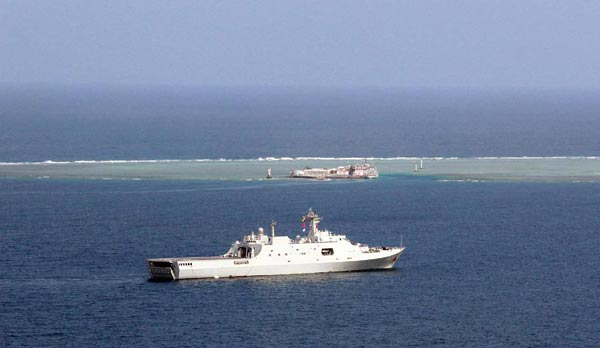 |
|
A formation of the Nanhai Fleet of China's Navy on Saturday finished a three-day patrol of the Nansha islands in the South China Sea. [Photo/Xinhua] |
The G7's statement last week expressing concerns over the "tense situation" in both the East and South China seas, and the ongoing biggest-ever joint military exercises between the United States and the Philippines have intensified tensions in the region. Meanwhile, some countries led by US keep lashing out at China's normal reefs fortification in the South China Sea.
These moves are all aimed at creating friction between China and its neighbors through reigniting the South China Sea dispute prior to the Asian-African Summit in Indonesia that marks the 60th anniversary of Bandung Conference and derailing the event from commemorating the "Bandung Spirit".
Sixty years ago, Asian and African countries that had just extricated themselves from Western colonial rule gathered in Bandung, Indonesia. Under the banner of "solidarity, friendship and cooperation", the meeting confirmed "anti-imperialism, anti-colonialism, and seeking common ground by shelving differences, as well as common development" as their common goals. The Five Principles of Peaceful Coexistence advocated by China constituted the norms to guide international relations and the exchanges between different countries.
The South China Sea dispute is only a problem arising in the development of China's relations with surrounding countries. It is China's long-cherished stance that it pursues a peaceful foreign policy of independence and adheres to the settlement of disputes through negotiations and consultations.
The disputed South China Sea islands have been a part of Chinese territory since ancient times. In the 1930s and 40s, France and Japan once occupied some of these islands and reefs, but sovereignty reverted to China after the end of World War II. As a sign of its territorial claim to these islands, the Chinese government later named them and marked their locations in published maps.
It is international practice to use longitude and latitude to decide the ownership of islands, that is, to draw a line along the outer edge of archipelagos as their boundaries to prevent drawing demarcation lines for them one by one. So, China's use of dotted lines, or dashes, to confirm its sovereignty over islands in the South China Sea conforms to international practice. From the perspective of historical practices in the South China Sea, China is not only entitled to exercise sovereignty over the islands, reefs, rocks and their surrounding waters within the demarcated lines, but also over underwater geographic features such as shoals.
China's fortification of reefs in the South China Sea, which are within the scope of its sovereignty, should be free from foreign intervention and not cause controversy and disputes. Such kind of reclamation accords with international law.
On Aug 25, 2006, the Chinese government issued a statement, announcing that any of its disputes with other countries involving maritime demarcation and the ownership of gulfs is not subject to the compulsory procedure of international arbitration.
China will not make concessions on issues involving its sovereignty disputes in the South China Sea despite the attempts by some countries to plant discord in its ties with some members of the Association of Southeast Asian Nations.
Sixty years ago, China chose to actively participate in the conference in Bandung to create a peaceful international environment favorable to the newly founded People's Republic and the "seeking common grounds by shelving differences" principle advocated by then-premier Zhou Enlai contributed much to the success of the milestone conference.
Only through the "dual track" approach proposed by China will the South China Sea disputes be resolved. The two tracks refer to peacefully and properly handling the disputes left from history through direct talks between the parties involved and jointly maintaining peace and stability in the South China Sea with the members of ASEAN. Such an approach to disputes settlement on a bilateral basis is an inheritance of the "Bandung Spirit". China and its Asian neighbors should properly resolve disputes and prevent them from being capitalized on by certain countries to sabotage stability in the Asia-Pacific region.
The author is a professor of international law and marine law at the Party School of the Central Committee of the Communist Party of China.

I’ve lived in China for quite a considerable time including my graduate school years, travelled and worked in a few cities and still choose my destination taking into consideration the density of smog or PM2.5 particulate matter in the region.